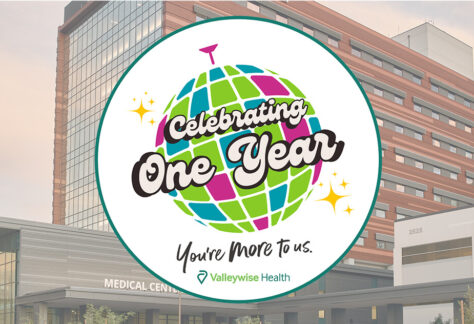In This Article:
- The effectiveness of ART treatments has long been proven, but now thanks to advances in technology, people have new treatment options for HIV. They no longer have to rely solely on oral treatment, or have their health be dependent on the daily intake of a pill. Monthly injections, such as cabotegravir, provide a new pathway for patients looking for more flexibility when it comes to HIV treatment.
In 2019, 18,462 people were living with HIV/AIDS in Arizona. There were 776 new (incident) cases of HIV/AIDS, and the HIV/AIDS incidence rate was 10.7 cases per 100,000 people. Valleywise Health has a long and respected reputation for providing care to LGBTQ+ patients through Valleywise Community Health Center — McDowell, a specialty clinic providing primary care services for HIV-positive patients, HIV prevention through PrEP and transgender hormonal therapy.
Although there is no cure for acquired immune deficiency (AIDS), you can get the virus under control with medications and preventive care. If you’ve just been newly diagnosed with HIV/AIDS, it’s extremely important to begin treatment as soon as possible. Taking your HIV medications as prescribed can result in an undetectable level of HIV in your blood. If you’re undetectable, you cannot transmit HIV to others—this is called “prevention through treatment.”
HIV/AIDS Services at Valleywise Health
Valleywise Health offers a wide range of HIV/AIDS services, regardless of how long you’ve had HIV or how healthy you are. If you have HIV, we will refer you to Valleywise Community Health Center — McDowell for further assistance. There, you’ll find outpatient support and care coordination services that give you everything you need to manage your condition. And don’t panic — we’ve got a team of HIV experts ready to provide you with exceptional treatment and care.
Some of the services we offer through our HIV/AIDS program:
- Early, quick intervention and prevention services
- Outpatient treatment
- Support services and care coordination
How Are HIV and AIDS treated?
HIV is treated using antiretroviral therapy, or ART. HIV medicine can be highly effective in reducing the amount of HIV in the body (viral load) to a very low level. HIV medicine can make the viral load so low that an HIV test cannot detect it. This is known as viral suppression, otherwise defined as having less than 200 copies of HIV per milliliter of blood.
Every person’s HIV treatment regimen is different, based on their medical history. Generally, a person’s treatment includes three HIV medicines from at least two different HIV drug classes. There are over 30 HIV medicines approved by the U.S. Food and Drug Administration (FDA) to treat HIV infection.
What Are the HIV Drug Classes? They Include:
- Non-nucleoside reverse transcriptase inhibitors (NNRTIs)
- Nucleoside reverse transcriptase inhibitors (NRTIs)
- Protease inhibitors (PIs)
- Fusion inhibitors CCR5 antagonists
- Integrase strand transfer inhibitors (INSTIs)
- Post-attachment inhibitors
It’s important to take your HIV medications exactly as they are prescribed, otherwise you are at a higher risk of developing AIDS, or worsening your immune system.
New Treatments for HIV/AIDS
Taking a pill, or a combination (two or more different HIV medicines combined in one pill), every single day isn’t feasible for every patient diagnosed with AIDS. People are liable to forget, or in some cases, patients don’t want to have to take a pill every day.
Luckily there’s been some recent advancements in HIV treatment that give patients more options when it comes to medicines. One of the new treatments for HIV/AIDS approved by the FDA is cabotegravir and rilpivirine. Cabotegravir and rilpivirine are long-acting injectable HIV treatments. The two medications are available as a monthly injection administered by a healthcare provider.
The effectiveness of ART treatments has long been proven, but now thanks to advances in technology, people have new treatment options for HIV. They no longer have to rely solely on oral treatment, or have their health be dependent on the daily intake of a pill. Monthly injections, such as Cabotegravir, provide a new pathway for patients looking for more flexibility when it comes to HIV treatment.
Lifestyle Changes
Along with monitoring your health and taking your prescribed medication, doctors recommend people living with HIV make positive lifestyle changes to improve their health. Here are a couple of tips:
- Maintain a strong immune system by eating a healthy diet, exercise often and/or sleep eight hours a day
- Reduce stress by practicing mindfulness, yoga or pilates
- Visit a therapist to talk through your fears, stress or anxiety regarding your HIV diagnosis
- Monitor your CD4+ (white blood cells) counts to check on the effects of the virus on your body
Providing compassionate, comprehensive care and support to people around the Valley living with HIV is one of our highest priorities. To get more information about HIV services, visit the Valleywise Community Health Center — McDowell. Call 1-833-VLLYWSE to book an in-person or virtual appointment today.
Sources:
- https://www.cdc.gov/hiv/basics/livingwithhiv/treatment.html
- https://hivinfo.nih.gov/understanding-hiv/fact-sheets/what-start-choosing-hiv-treatment-regimen
- https://www.azdhs.gov/documents/preparedness/epidemiology-disease-control/disease-integrated-services/hiv-epidemiology/reports/2020/annual-report.pdf






